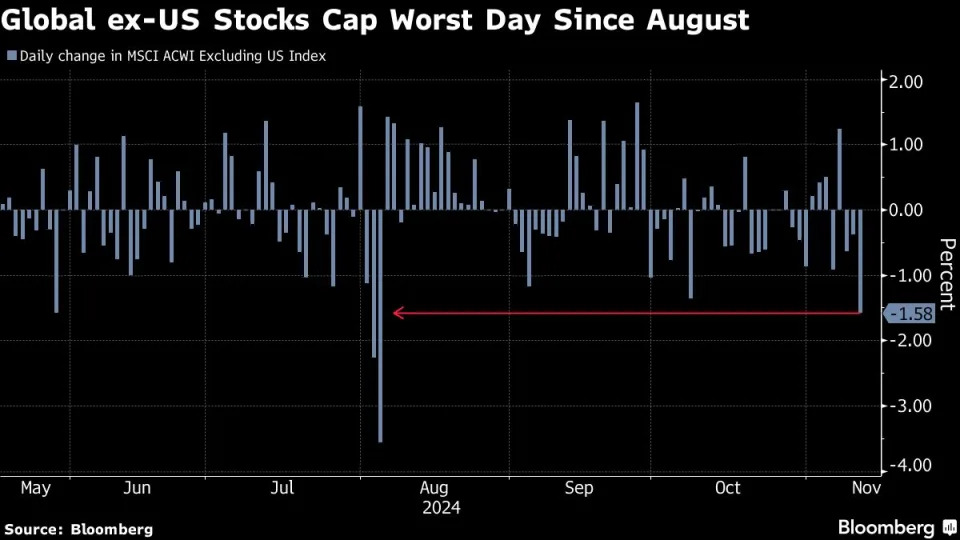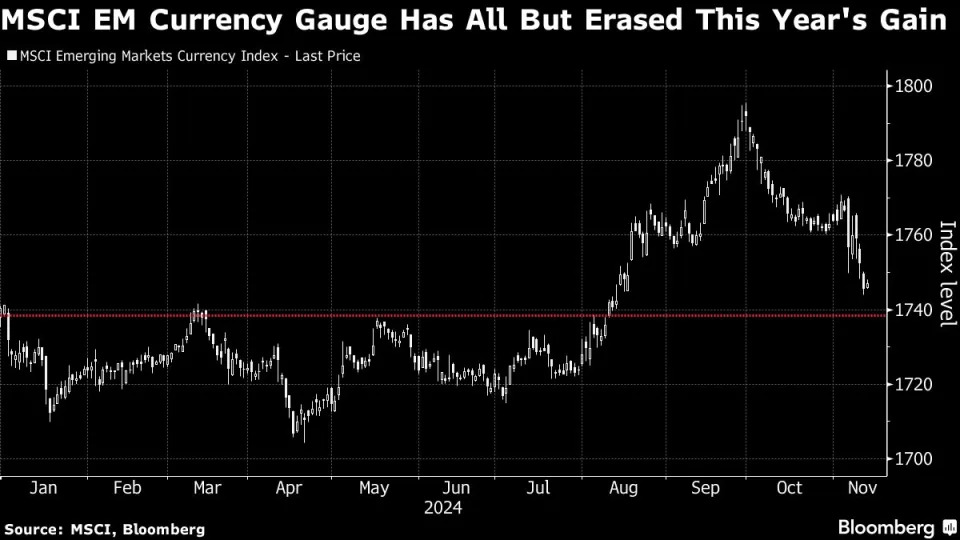News
Rest of world’s markets broken by Trump’s America-first plan
(Bloomberg) — Donald Trump’s election victory has catapulted US stocks to fresh records and pushed the dollar to a two-year high. It’s anything but good news for the rest of the world.
Equities excluding the US are tumbling, with an MSCI gauge at its lowest in three months. An index of developing-market currencies has lost more than 1% following the US election, coming close to erasing this year’s gains. European stocks and the euro have flopped.
The stark divide between US and non-US assets has become more pronounced as Trump’s cabinet starts to take shape, with loyalists ready to carry out his “America First” proposals named for key posts. That has confirmed the worst of investors’ fears: that the push for higher tariffs, particularly on China, will gain momentum, alongside a host of potentially disruptive policies that can drive inflation higher and bind the hands of central banks.
Such worries have prompted investors to park their money in US assets. Fund managers’ exposure to American stocks jumped to the highest since 2013, according to a survey from Bank of America Corp. On the other hand, emerging markets such as China and Mexico, often seen as the most vulnerable to Trump’s trade policies, have taken a hit.

Trump’s more domestic-focused policies will favor US companies, said Rajeev De Mello, chief investment officer at Gama Asset Management SA. “We did reduce risk ahead of the US election, and it’s now time to increase portfolio exposure but rotate into investments which will benefit from Trump’s expected policy choices.”
Wednesday is shaping up to be another grim day, with an MSCI benchmark for Asian stocks sliding more than 1% and setting the stage for a weak session in Europe. Shares in South Korea were headed for a one-year low as foreigners sell companies like Samsung Electronics Co. ( 005930.KS ) that are vulnerable to trade protectionism.
A Bloomberg gauge of the dollar ( DX=F ) edged higher after reaching its highest since November 2022 in the previous session.

Investors are closely tracking cabinet appointments for clues on whether Trump’s campaign rhetoric will materialize into policies. The president-elect had earlier vowed to impose massive new tariffs, eyeing a duty of 20% on all foreign goods and 60% or higher on those coming from China. That’s revived fears of another trade war that can disrupt global supply chains and hurt companies with a heavy reliance on US sales.
Trump’s other proposals include mass deportation and tax cuts, which could lead to higher inflation and limit the Federal Reserve’s room to cut rates.
As those prospects support the greenback and pressure emerging market currencies, some central banks including Bank Indonesia and Banco Central do Brasil have stepped into markets in the past week to support their currencies.
The People’s Bank of China set its reference rate for the yuan stronger than the market’s estimate on Wednesday, indicating its discomfort with currency weakness amid the threat of higher US tariffs.
That’s not to say there are no pockets of safety.
Money managers such as Pictet Asset Management SA are boosting their investments in markets like India that are deemed to be less affected by Trump’s policies. Punitive tariffs on Chinese goods can also spur a shift of investment away from the world’s second-largest economy and toward Southeast Asia, according to Kasikorn Asset Management Co.
But for now, US assets seem to be a clear winner.
“The ‘US exceptionalism’ theme looks like it still has plenty left in the tank,” said Michael Brown, a senior strategist at Pepperstone Group Ltd. “I still have full faith in the bull case for equities, particularly with the incoming Trump Administration likely to provide a further fillip to economic growth, and corporate earnings, via a renewed round of tax cuts.”

